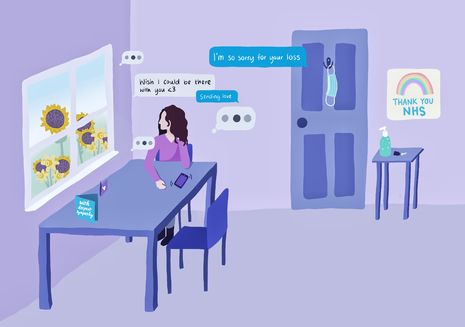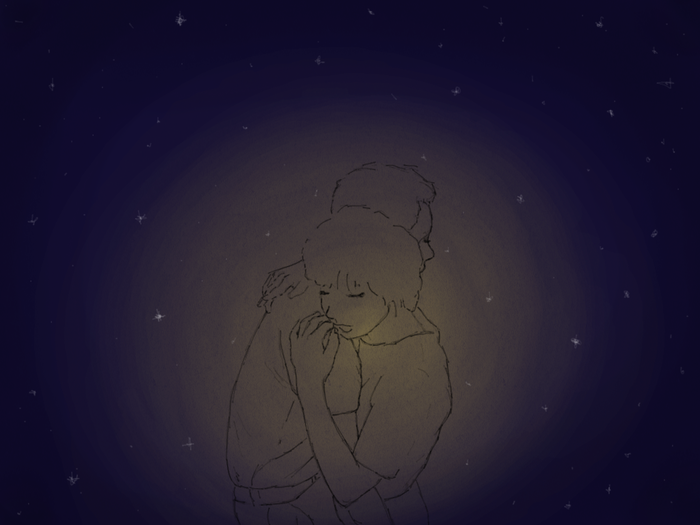A State of Mourning
“The injustice of their deaths will continue to haunt us, the ones left behind” writes Annabel Morgan, in an exploration of grief during the pandemic, and a cry for the nation to come together in commemoration

Content Note: This article contains a detailed discussion of death and grief and brief mentions of hospitalisation
Pandemic grief has been a bolt from the blue. Lockdowns have deprived us of the precious weeks leading up to a loved one’s death, those valuable weeks before the painkillers keeping their cancer pain at bay gnaw away at their minds and consciousness. The day Wales reopened their borders, my dad rushed down to see his brother, only to find him in what Philip Larkin called that state of ‘thin continuous dreaming.’ He was already gone, really.
“The narrative dictates that you should be with someone when they die, all so they can have a ‘good death’, a meaningful death. But it is not always white walls and pristine hospital beds and peaceful slipping away; there rarely is such poetry”
We had not known long, only a few weeks from diagnosis to death. Still coming to terms with it myself, I feel like I need to stick my fingers down my throat and force myself to grieve. I’ve grown increasingly disillusioned with the Hollywood dream we are force-fed. The ‘Victorian deathbed’ narrative dictates that you should be with someone when they die, have that solemn bedside speech in the last few hours, all so they can have a ‘good death,' a meaningful death. But it is not always white walls and pristine hospital beds and peaceful slipping away; there rarely is such poetry.
Thousands of people will find themselves in my situation, whether it be Covid who robbed them of their loved ones, or all the other illnesses that went undiagnosed in the past year. The injustice of their deaths will continue to haunt us, the ones left behind. The anxiety and isolation exacerbated by lockdown have suffocated us further; we are ill-prepared for grief on such a scale because we have such an awful relationship with grief in this country. And I do specify this country. Our National Identity of composure, containment, and calmness gives us a complete falsehood of contentment. Suffering in silence must end and I can see no better opportunity than seizing the pandemic to address this.
In a recent interview with the Guardian, David Kessler defined grief as “a change we didn’t want”; this change is not only the loss of human life, but the loss of life you once had. Intertwined like flax, you cannot grieve one without the other, you mourn for your past sense of self and own life as much as the life of your loved one. I know that I’ve found it emotionally exhausting looking out the window and seeing grief reflected back at me. The bare streets, the distancing, the face masks — I worry I can actively feel the damage it’s doing to me, this abstinence of touch and comfort. It’s clear there is no escape from death in this seemingly dystopian world we now live in, but I know we will all learn to dance again, albeit with a slight limp. Time is a natural healer because of the relentlessness of life; it will carry on and force you along with it. I do not know if my father will ever get over the pain of losing a brother, nor will my grandfather ever recover from the loss of a son. But in time he will learn to manage that pain; the wound will scar, but it will heal.
“Public displays of grief, ceremony, help encourage our individual mourning, and without it, I fear this country will suffer more with post-traumatic stress than post-traumatic growth”
We will need a third lung to be able to breathe again after the pandemic. As a nation, we cannot rely on time to pull us along. We will survive this crisis but we must address it, we cannot afford to forget this pain and brush it under the carpet. The United Kingdom has a dismal record of commemorating deaths from pandemics. It is to our shame that we have no national memorial from 1920, commemorating those lives lost in the Spanish flu. I should hope that our society has evolved since then, now more open and accepting of emotion, in whatever form that might take. We must now be the living testament to that change. We have all been to our local war memorial or watched the Cenotaph on television. It is of vehement importance that after this crisis, the Covid pandemic is treated with the same respect and solace. Ceremony and tradition have been a part of human culture for thousands and thousands of years, and mourning has always been a social activity. Covid has stripped this celebration of life from us, instead leaving us with no choice but to resort to Zoom, watching services taking place hundreds of miles away. It is of no surprise that our loved ones' absence feels like a presence, a black hole. Public displays of grief, ceremony, help encourage our individual mourning, and without it, I fear this country will suffer more with post-traumatic stress than post-traumatic growth. I implore for monuments, places where people can come together and remember. We must remember.
We must confront uncomfortable truths on an individual as well as a national scale. It has always struck me how in death everyone suddenly becomes ‘wonderful’, regardless of the lived truth. We have to face grief head-on, and in our spoken condolence, never erase a person out of existence with our good intentions. We must remember their flaws as well as their virtues, find joy in their humanity, for better and for worse. We must remember them as a whole person, all their faces.
“I loved him very very much, but he died anyway.” I’ve come to realise that it doesn’t matter that we were absent at our loved one’s moment of passing because what truly matters is that we were with them while they lived. Hold onto that love and never let it go.
Cysga’n dawel
For Kate, Ieuan, Kevin, and Greg.
 Comment / Plastic pubs: the problem with Cambridge alehouses 5 January 2026
Comment / Plastic pubs: the problem with Cambridge alehouses 5 January 2026 News / Uni-linked firms rank among Cambridgeshire’s largest7 January 2026
News / Uni-linked firms rank among Cambridgeshire’s largest7 January 2026 News / New movement ‘Cambridge is Chopped’ launched to fight against hate crime7 January 2026
News / New movement ‘Cambridge is Chopped’ launched to fight against hate crime7 January 2026 News / SU stops offering student discounts8 January 2026
News / SU stops offering student discounts8 January 2026 News / Cambridge businesses concerned infrastructure delays will hurt growth5 January 2026
News / Cambridge businesses concerned infrastructure delays will hurt growth5 January 2026









